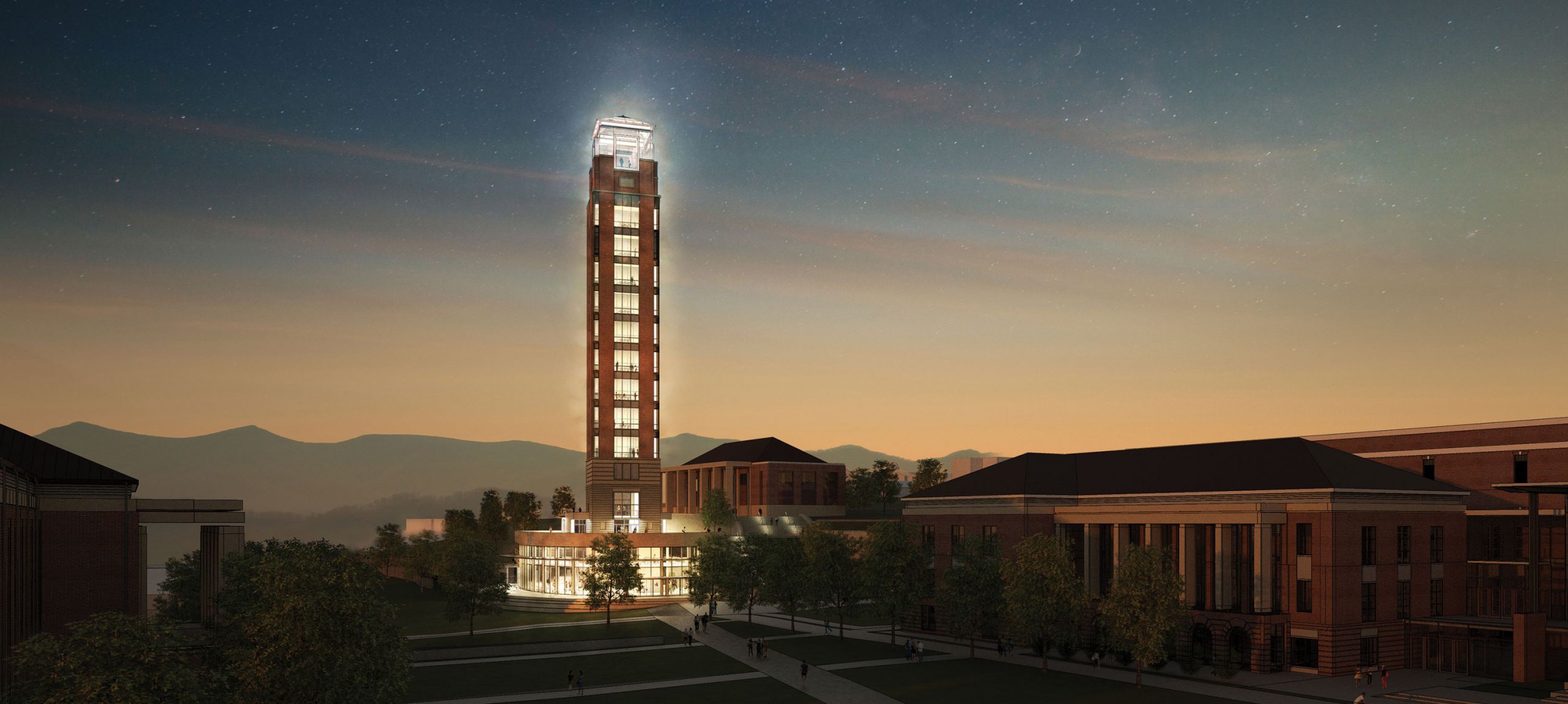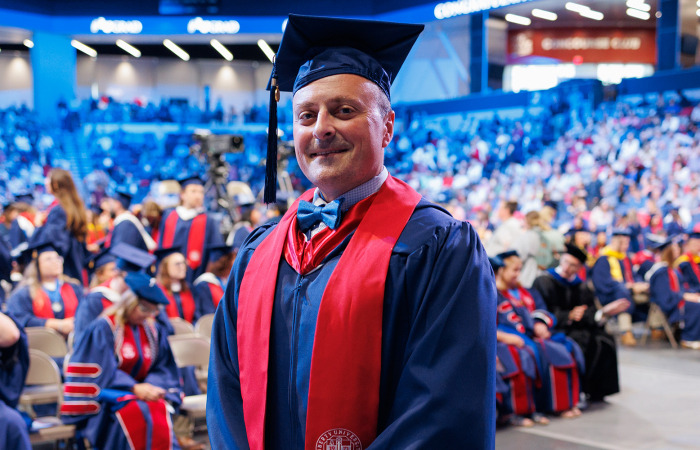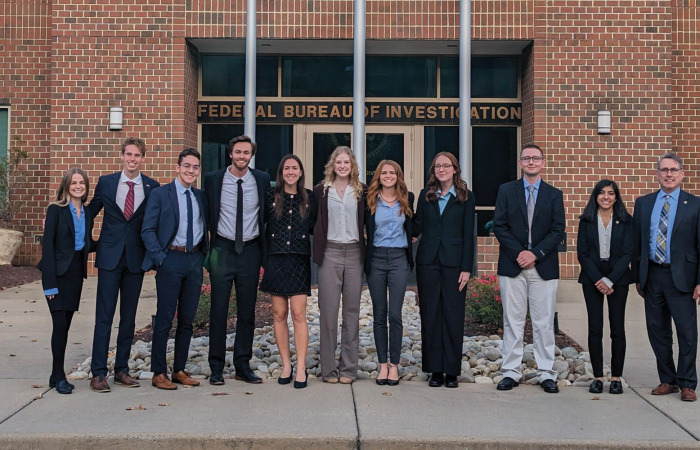When President Jerry Falwell announced in March that the undergraduate School of Religion was joining Liberty University Baptist Theological Seminary to form the new School of Divinity, the faculty, staff, and students waited eagerly for news on where their new facilities would be located.
With both programs experiencing continual growth — approaching a total of 20,000 undergraduate and graduate students studying on campus and online — the decision to form the School of Divinity resulted in the world’s largest accredited school for religious studies and ministerial training.
This stature required a building that would accommodate the growth and allow Liberty to continue equipping tomorrow’s Christian leaders. When the administration took a closer look at its Master Plan for the rebuilding of campus earlier this spring, one new structure stood out above the others — literally.
The 275-foot Independence Tower will be located just north of DeMoss Hall, and construction will begin later this summer.
As design work progressed and the administration considered options for the best use of its space, it became obvious that the tower and its large base would be the perfect site for Liberty’s newest school.
“Housing the School of Divinity within the Independence Tower will give the school a prominent location on the main campus, emphasizing Liberty’s historic commitment to biblical, theological, and ministry training,” said Dr. Ed Hindson, who was appointed dean of the School of Divinity in March.
Liberty University was founded in 1971 as Lynchburg Baptist College, and many of its first courses centered on ministry training. The seminary was established in 1973. Though today Liberty has over 420 programs of study across all major disciplines, from nursing to education, engineering, medicine and law — all taught from a biblical worldview — the training of ministers and servants of the Gospel has remained an essential part of its academic offerings. Liberty graduates are doing their part to fulfill the Great Commission from the pulpit, the classroom, the workplace, and the mission field.
While its new home is not scheduled to be completed until Spring 2017, the School of Divinity will continue to offer degree programs at the associate, bachelor’s, master’s, and doctoral levels. Courses, taken on campus or online, fall under four major departments: Biblical Studies, Christian Leadership & Church Ministries, Global Studies, and Theological Studies.
In addition, the School of Divinity houses the Center for Asian Ministries, Center for Chaplaincy, Center for Youth Ministries, Center for Ministry Training, Center for Judaic Studies, and the Center for Apologetics & Cultural Engagement. These centers provide opportunities for students from any discipline to gain additional training in specialized areas of ministry and are designed to bridge religious studies to the larger university and evangelical community.
“The decision to create the School of Divinity was directly tied to the university’s mission to Train Champions for Christ to impact tomorrow’s world,” Falwell said in a news release. “This merger will consolidate the faculties and other vast resources of both schools, allowing more students to have direct access to nationally renowned professors and dedicated leadership.”
Hindson leads that charge as a distinguished professor who has served at Liberty for more than 25 years (most recently as dean of the School of Religion) and is considered one of the world’s leading Bible scholars. He has assembled a staff of highly trained individuals, giving students the opportunity to learn from critically acclaimed faculty with degrees from some of the world’s top institutions of higher learning. Faculty members include: Mark Allen, Ph.D., University of Notre Dame; Gabriel Etzel, Ph.D., Southern Baptist Theological Seminary; Chris Gnanakan, Ph.D., University of Leeds (England); Gary Habermas, Ph.D., Michigan State University; Leo Percer, Ph.D., Baylor University; Kevin King, Ph.D., University of Pretoria (South Africa); David Baggett, Ph.D., Wayne State University; Randall Price, Ph.D., University of Texas; and Gary Yates, Ph.D., Dallas Theological Seminary.
Etzel is serving as administrative dean of the School of Divinity. Associate deans are Dr. John Cartwright, residential programs, and Dr. Troy Temple, graduate programs.
The consolidation of the undergraduate and seminary programs under one roof will bring additional consistency to Liberty’s religious studies. Other schools across the university, such as the School of Behavioral Sciences, the School of Business, and the School of Education, are successful models of housing undergraduate and graduate programs in one academic unit to train professionals.
“By housing both our undergraduate and graduate religion programs under a united administrative structure, we can operate more efficiently and effectively to benefit all of our biblical, theological, and ministry students,” Hindson said.
He added that the School of Divinity will continue to expose students to conservative evangelical theology and opportunities for practical ministry and evangelistic outreach. It will also continue the momentum generated by strategic relationships the university has established with local, national, and global organizations and ministries, such as the Billy Graham Evangelistic Association, Second Baptist Houston, Cross Church, Prestonwood Baptist Church, Thomas Road Baptist Church, the International Mission Board (IMB), and the North American Mission Board (NAMB).
Dr. Ronald Hawkins, vice president for Academic Affairs and provost, said the new school will keep Liberty at the forefront of religious and ministerial training.
“The School of Divinity is a sign of Liberty University’s ongoing commitment to its roots,” he said. “The new program structure will allow Liberty to continue to build on its rich tradition of producing church and ministry leaders to serve locally and abroad while keeping programs relevant for new generations to meet needs around the world.”
Degree offerings
Doctor of Philosophy in Theology and Apologetics (Ph.D.)
Doctor of Ministry (D.Min.)
Master of Theology (Th.M.)
Master of Arts (M.A.)
Master of Arts in Religion (M.A.R.)
Master of Religious Education (M.R.E.)
Master of Divinity (M. Div.)
Biblical Studies (B.A.)
Biblical and Educational Studies (B.S.)
Christian Leadership & Management (B.S.)
Christian Leadership & Church Ministries (B.S.)
Global Studies (B.S.)
Pastoral Leadership (B.S.)
Religion (B.S.)
Religious Studies (B.S.)
Youth Ministries (B.S.)
Religion (A.A.)
For a complete listing, visit: www.Liberty.edu/Divinity.




